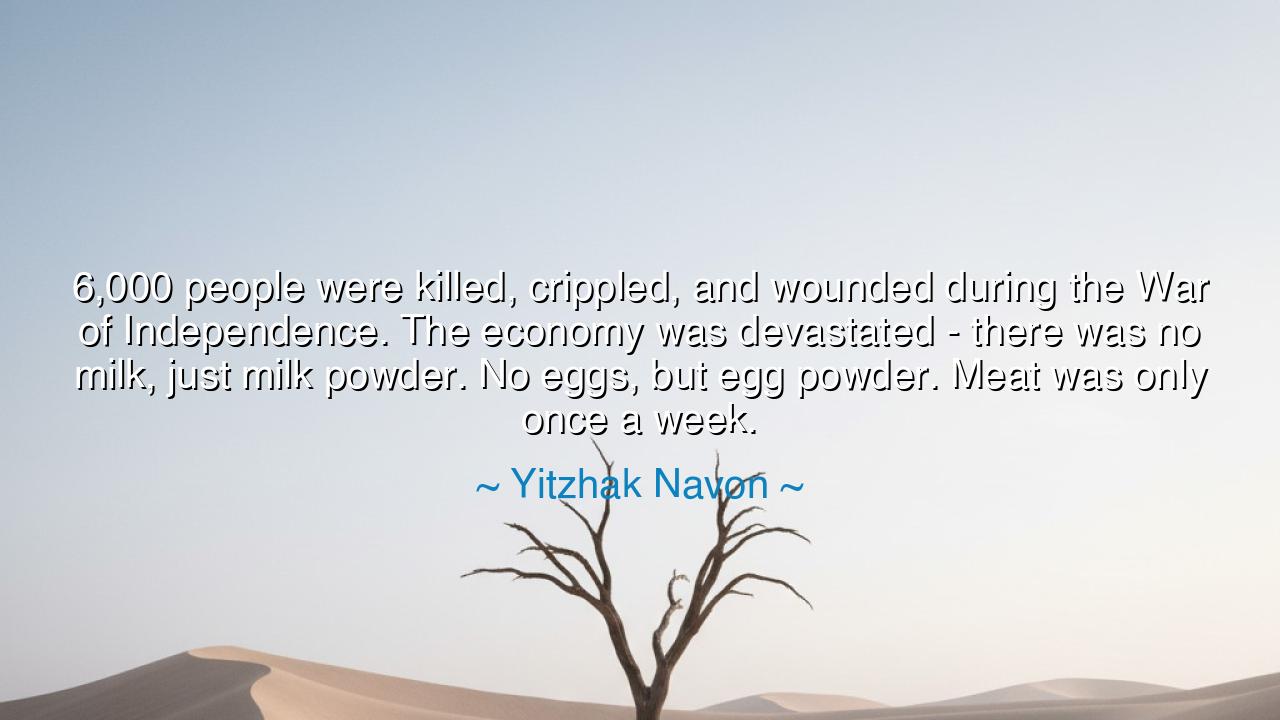
6,000 people were killed, crippled, and wounded during the War of
6,000 people were killed, crippled, and wounded during the War of Independence. The economy was devastated - there was no milk, just milk powder. No eggs, but egg powder. Meat was only once a week.






The words of Yitzhak Navon, Israel’s fifth president and one of its great humanists, are both a remembrance and a revelation: “6,000 people were killed, crippled, and wounded during the War of Independence. The economy was devastated — there was no milk, just milk powder. No eggs, but egg powder. Meat was only once a week.” Beneath this simple account lies the echo of an entire nation’s birth — a truth carved in sacrifice, endurance, and the relentless spirit of a people who rose from ashes to build a homeland. Navon’s reflection is not just a chronicle of hardship; it is a testament to the price of freedom and the resilience of the human spirit when faced with impossible odds.
The origin of this quote lies in Navon’s recollection of the early days of Israel’s War of Independence in 1948 — a time when a newborn nation, barely declared, was immediately besieged by forces determined to destroy it. At that moment, Israel’s population was fragile, its resources scarce, and its future uncertain. Six thousand souls — one percent of the Jewish population then living in the land — perished in the struggle for sovereignty. Navon’s words, spoken decades later, carry not only the pain of loss but also the awe of survival. For those who lived through that time, every rationed meal, every night without light, every tear shed over a fallen comrade was a thread in the fabric of independence — woven through suffering, held together by faith.
The deprivation he describes — milk powder instead of milk, egg powder instead of eggs, meat only once a week — may seem to modern ears like mere inconveniences. Yet to those who endured it, these details were symbols of the new nation’s fragility. Food was scarce, but hope was abundant. The people did not complain, for they understood that freedom’s feast is not served upon comfort, but upon endurance. Navon’s recollection paints not a picture of despair, but of dignity — a reminder that the strength of a people is not measured by their abundance, but by their ability to persevere when all abundance is gone.
The ancients, too, knew this truth well. When Moses led the Israelites through the wilderness, they survived not on luxury, but on manna — a daily miracle that sustained body and soul. The wilderness was their trial, the price of reaching the Promised Land. So it was again in 1948, when the desert of struggle returned, this time in the form of siege, hunger, and sacrifice. Freedom demanded not only courage in battle, but humility in scarcity — the willingness to endure suffering so that the generations to come might never know it. Navon’s words remind us that independence is not an event, but an inheritance bought with suffering, and one that must be remembered lest it be forgotten in times of plenty.
But even amidst deprivation, there was greatness. Mothers stood in line for food not with bitterness, but with quiet pride. Children played among ruins and learned to dream of building houses upon them. Soldiers, underfed and underarmed, fought not for conquest, but for existence — for the simple right to live freely in their own land. From such hardship was born a nation whose strength was not in wealth or power, but in unity, faith, and an unbreakable will. Navon, who himself served in those early years, saw firsthand that the foundation of Israel was laid not by gold, but by courage.
History repeats this lesson in every land where freedom is born. America’s own War of Independence left fields burned, families scattered, and economies ruined, yet from that struggle emerged a republic that became a beacon to the world. The same was true for India, whose fight for self-rule under Mahatma Gandhi was marked by hunger, imprisonment, and sacrifice. The story of every free nation begins not with triumph, but with trial. It is suffering, not success, that purifies the meaning of liberty. Navon’s account stands as one voice in that eternal chorus of nations that have paid dearly for the right to call themselves free.
And so, the lesson his words carry is eternal: freedom is never cheap, and comfort should never make us forget the cost of those who secured it. The milk and eggs we take for granted today were once dreams deferred by war. The peace we enjoy is the harvest of fields once watered with tears. To honor that past is not to dwell in sorrow, but to live with gratitude and vigilance — to protect what was bought with blood, and to teach the next generation the value of endurance.
Let us then remember, as Yitzhak Navon did, that independence is not sustained by prosperity alone, but by memory, humility, and duty. A nation that forgets its hardships becomes soft; a people that remember them remain strong. Just as Israel once rose from scarcity to sovereignty, so too must every person learn that greatness is born not from ease, but from struggle. For when we understand the price of freedom, we cherish it not as entitlement, but as sacred inheritance — one that demands courage to earn, wisdom to preserve, and gratitude to uphold.






AAdministratorAdministrator
Welcome, honored guests. Please leave a comment, we will respond soon